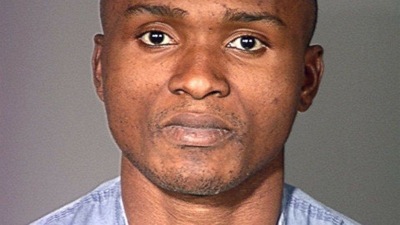Charley Saturmin Robinet — he was “no angel”; now he’s dead
Black males, especially those from low-income background are in constant danger from death at the hands of police.
Now the second day story is that the homeless man who was shot multiple times and killed by police in Los Angeles is that he was wanted for violating a probation terms of a bank robbery and that he was living under an assumed name.
Is that justification for his shooting to death by police or is this a smoke screen?
Did the police officers know his probation status when they approached him and a group of other homeless people in Los Angeles? He certainly was not in the middle of robbing a bank and clearly wasn’t armed.
The police claim he tried to grab an officers gun.
Why was the officer in the kind of proximity that would even make that possible? If the officer or officers for some reason knew he was a dangerous man — presumably that’s why they approached him, to follow their own logic– would they not have maintained a secure distance, with their guns drawn, to preclude the possibility of the suspect trying to grab an officer’s gun?
Unless that’s of course a bogus after-the-fact assertion to justify the killing of an unarmed man after the altercation with the officers began.
The Los Angeles Police Department report that videos of the incident are available made from body cameras worn by the officers.
There should not even be a debate. The videos should be released immediately to the public so that the public can see what happened even as we await an explanation from the Police.
And after the non-indictment of Daniel Pantaleo for strangling Eric Garner to death in New York City, the whole world now knows that even video evidence is not sufficient to secure an indictment when an officer is clearly guilty of murdering an unarmed Black man.
Many people forget that even with the video evidence of Rodney King’s brutal assault, being struck with police sticks nearly 60 times, in 1991 by four Los Angeles police officers — the officers were still acquitted of the charges anyway. It was only after a federal grand jury indictment and trial for the violation of Rodney King’s civil rights that two of the four officers were convicted while two were acquitted.
There is no value attached to the lives of Black males, especially those from low income background.
They are killed and the officers generally get away with impunity, because of class as well as the color of their skin.
Officer Daniel Pantaleo of the NYPD would not have jumped on Eric Garner’s back and viciously strangled him to death — he never even would have approached him in the first place if Garner was dressed in a suit and seemed to have been a man of means.
Pantaleo judged Garner, as much as by the outfit he was wearing — T-shirt and shorts– as by the color of his skin.
Similarly, Officer Darren Wilson would not have pulled his car and stopped Michael Brown as he walked home with a friend had Brown been wearing a suit and carrying a brief case.
Even though well-dressed executives commit the biggest crimes in the United States, embezzling or stealing hundreds of millions of dollars, they are given consideration and are rarely approached without the existence of probable cause.
Not so for people who are not well-dressed; especially Black males.
And in all the cases — Garner, Brown, and now the homeless man– the police are quick to disseminate to media the background or records of the dead men. In Ferguson, after police released the video of Brown allegedly taking cigarillos from a store, The New York Times followed up shortly with an article where the writer noted that Brown was “no angel.” (Presumably, the inference was that his killer Wilson was more “angelic.”)
This is not to say that well-dressed Black males have not also had violent police encounters; but by and far, those killed recently all seemed to have been pre-judged as of low-income status and in fact were.
Given the disproportionate interaction between Black males, law enforcement and the criminal justice system — due to unemployment levels that are generally double that of the White population, and aggressive policies such as stop-and-frisk and “broken windows”– it’s not surprising that many Black males would have some sort of record.
Newspaper and broadcast media editors publicize the information without demanding to know about the background of the officers involved in the killings.
So are Black males all fair game for executions by police officers in the streets of the United States with impunity because they have records? And because, to borrow from The New York Times, they are not “angels” with the officers who kill them get away regardless of the circumstances?
Garner, Brown, and now the homeless man, identified as Charley Saturmin Robinet, 39, are all dead at the hands of police officers because they were of lowly socio-economic status in addition to being Black males.
The presumption by the officers who killed them is that since they didn’t appear to be wealthy, they were criminal, likely to be criminals, or at least dispensable.
All the body cameras in the world won’t deter Police officers from killing similarly-situated Black males.
It’s good that in recent weeks prominent law enforcement officials, such as the FBI director James Comey and NYPD Police Commissioner William Bratton — a big proponent of “broken windows”– have spoken about racism role in policing African American communities.
The time for merely talking about the problem is over.
The crises we face is much bigger than has been acknowledged and it’s unlikely that an explosion on the streets of America will be avoided one day unless the conduct of police officers towards Black males change quickly.





